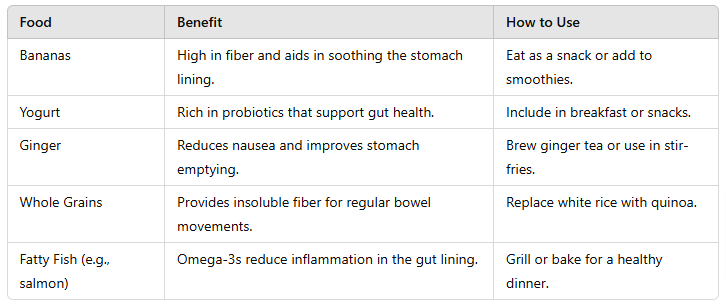
Your digestive system plays a crucial role in overall health, influencing everything from nutrient absorption to immune function. Incorporating digestive-friendly foods into your diet can alleviate discomfort, improve gut health, and support long-term wellness.
This guide provides actionable tips for introducing these foods into your daily meals without sacrificing flavor or convenience.
What Are DigestivBest digestive-friendly foods-Friendly Foods?
Digestive-friendly foods are those that ease the digestion process, support gut health, and provide essential nutrients. These foods are often rich in fiber, probiotics, and digestive enzymes.
Key Nutrients in Digestive-Friendly Foods

Benefits of Digestive-Friendly Foods
1. Improved Gut Health
A diet rich in probiotics fosters a balanced gut microbiome, essential for overall health.
2. Enhanced Nutrient Absorption
Foods high in fiber and digestive enzymes optimize nutrient uptake, ensuring your body gets the most from your meals.
3. Reduced Digestive Discomfort
Incorporating these foods can alleviate bloating, gas, and irregular bowel movements, making meals more enjoyable.
Tips for Incorporating Digestive-Friendly Foods into Your Diet
1. Start with Fiber-Rich Foods
Fiber is essential for healthy digestion. Gradually increase your intake to avoid bloating.

2. Include Fermented Foods for Probiotics
Probiotics help maintain a healthy gut microbiome.
- Add a serving of yogurt or kefir to breakfast.
- Use kimchi or sauerkraut as a side dish.
3. Stay Hydrated
Water aids in breaking down food and preventing constipation.
- Aim for at least 8–10 glasses of water daily.
- Infuse your water with lemon or cucumber for added flavor.
4. Incorporate Natural Digestive Enzymes
Certain foods contain enzymes that make digestion smoother.
- Use pineapple in salads or desserts for bromelain.
- Add papaya as a snack or ingredient in smoothies.
5. Make Gradual Changes
Introduce these foods slowly to avoid digestive upset and help your body adjust.
Examples of Digestive-Friendly Foods and Their Benefits

Overcoming Challenges
1. Addressing Food Intolerances
If you’re sensitive to certain foods, choose alternatives. For example, lactose-intolerant individuals can opt for lactose-free yogurt or almond milk kefir.
2. Finding Creative Ways to Prepare Meals
Use herbs and spices like ginger, turmeric, and cinnamon to enhance flavor without adding sugar or salt.
3. Staying Consistent
Incorporating digestive-friendly foods consistently is key to long-term benefits. Meal prep can help you stay on track during busy weeks.
Key Takeaways

Incorporating digestive-friendly foods into your diet doesn’t have to be daunting. Start small by adding fiber-rich foods, fermented products, and natural enzymes to your meals. Over time, these changes can transform your digestive health, making you feel more energized and less prone to discomfort.
Prioritize your gut — it’s the foundation of your overall well-being.









